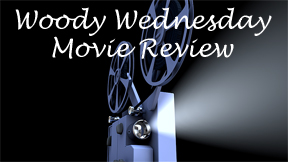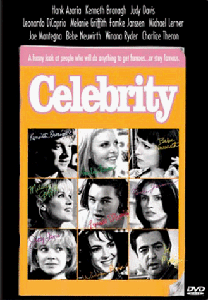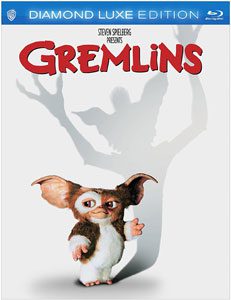A prolific filmmaker with a home base outside of Hollywood, Woody Allen is positioned to both view and be baffled by celebrity culture. In 1980’s “Stardust Memories,” he shows the reluctant celebrity’s POV through a character who is hounded by autograph-seekers and requests to read amateur screenplays even as he tries to live the normal portion of his life.
In “Celebrity” (1998), writer-director Allen wades more deeply into the celebrity side of things via Lee (Kenneth Branagh). He’s the Woody Allen Character, but with a spin: He wants to escape normalcy. Lee is on the periphery of New York’s celebrity culture — a magazine profile writer who hopes to break through with a screenplay or novel.
Contrasting Lee and Robin
The other focal character is wife Robin (Judy Davis), whom Lee makes his ex-wife early in the film in order to pursue his chronic love addiction. As Lee lands and discards women, obsessed with finding the perfect match, Robin – neurotic in a different way – frets that she’s not doing enough with her life. But then her next love (Joe Mantegna’s Tony) lands right in her lap.

“Celebrity” (1998)
Director: Woody Allen
Writer: Woody Allen
Stars: Kenneth Branagh, Judy Davis, Joe Mantegna
At 113 minutes, the black-and-white “Celebrity” seems long if you’re on an Allen kick. It earns its runtime by being smart, although it’s not funny via punchlines. Rather, a reflective commentary comes via parody as the film asks (as Robin puts it): “Why do we celebrate who we celebrate?”
Because celebrity culture is so close to parody anyway, even the extreme scenes might not have you laughing; they might leave you overwhelmed. However, I found “Celebrity’s” overall structure as clever as “Stardust Memories,” but more accessible. It’s a controlled, coherent brand of chaos.
The reason for the length is a rare five-act structure (most films use three acts) wherein the rising action and falling action mirror each other. Also, there are tons of characters, most played by big names; this was the third of three-straight loaded casts in Allen films (following “Everyone Says I Love You” and “Deconstructing Harry”). A new generation of talent was tripping over themselves to get into Allen films.
Leo in the middle
Although we follow Lee and Robin on their separate post-divorce journeys, it’s actually Leonardo DiCaprio – the world’s biggest celebrity in the wake of “Titanic” — who dominates the climactic third (middle) act. He plays Brandon Darrow, a spoiled, in-demand actor.
We – and Lee, who is trying to get a word in edgewise – follow Brandon through abuse of his girlfriend (Gretchen Mol), hotel-room destruction, an arrest and quick forgiveness (because no one will press charges), a private-limo and plane trip to a boxing match, and a tryst with several women in a luxury suite. Insanely, Lee is part of a sexual foursome by the end, still trying to have a worthwhile discussion with Brandon.
Even on either side of that showy vignette, Lee’s arc is overwhelming for introverts. But it’s balanced out by Robin’s calmer journey, which gives us a breather.
A more arrogant ‘Allen Character’
As for the performances, Branagh’s Lee strikes me as less likable than if a young Allen were playing the role. Although his inflection is a perfect imitation of Allen’s, Branagh’s confidence slips into arrogance. Granted, this is difficult balancing-act of a role, since Lee is both the villain (as compared to Robin) and an audience surrogate.
Meanwhile, Robin is the most robust turn by the always-great Davis among her five Allen pictures. In the end, Robin’s arc is that things work out for her via luck. It does soothe me to know it’s possible to find your soulmate via luck.
But what’s really great is Davis’ performance. She nails some of the best physical humor by an Allen female lead since Diane Keaton – hiding from her ex, being nervous about Tony’s courtship, and most memorably, trying to learn oral-sex technique from a professional sex worker (Bebe Neuwirth).
Continuing with my analysis of the mirroring five-act structure, Lee sees young hottie Nola (Winona Ryder, at the height of her celebrity) in Act I, but not again until Act V. Robin is shocked by the divorce in Act I, comfortably married in Act V.
Robin creates her own unnecessary drama by consulting with a plastic surgeon in Act II, and by skipping her own wedding in Act IV. Both insane acts nonetheless work out perfectly. Meanwhile, Lee blows it with Charlize Theron’s lingerie model in Act II, and then blows it with girlfriend Bonnie (Famke Janssen) in Act IV.
Maybe they really are different from us
The way Lee blows it with Theron is by distractedly driving his car into a storefront. This is one of a handful of examples – though none as wild as the DiCaprio segment — of Allen putting bizarre real-world tabloid incidents into “Celebrity.” Theron flees the scene because it will be horrible for her career if she’s found there.
Allen shows us that celebrities have to have a different way of looking at the world in order to maintain a positive public standing. Part of why the percentage of monsters in Hollywood (as exposed by the #MeToo movement) turned out so alarmingly high is because these people can’t operate normally. They have to hide all their worst traits rather than getting psychological help.
That’s not an excuse from me, merely an explanation. Nor does Allen let his characters off the hook (except those who don’t desire fame). At the least, he makes fun of them; in the case of wannabe-celebrity Lee, he punishes him.
He can’t shake the stars in his eyes
Lee confuses Ryder’s unstable nymph with Happiness. This classic Allen-film mistake gains an extra layer against this backdrop, because “Celebrity” shows us how we tend to confuse entertainers with people who matter.
This tendency isn’t purely borne of idiocy, but also because we subconsciously desire to escape from important issues (Admit it, you don’t want me to change the subject to the Federal Reserve’s destruction of the dollar right now). The very existence of celebrities is unnatural, a side effect of humans’ need for escapism, “Celebrity” posits.
We shouldn’t feel bad for people who have riches, fame and easy access to hot women and loyal hangers-on – and who are allowed exemptions from societal rules and even laws. Yet by the end of “Celebrity” (especially if double-billed with “Stardust Memories”), you won’t wish stardom on your worst enemy.


